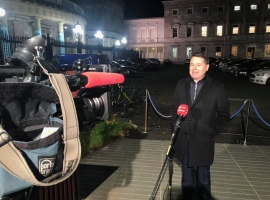
Ireland's central bank will reduce the pace of bond-buying under the euro zone's quantitative easing stimulus programme and is confident it can remain in the scheme until its scheduled end in December 2017, a source familiar with the matter said on Friday.
The source said the central bank would reduce the pace of purchases -- which have stood at around 1 billion euros a month recently -- by around 50%.
This should allow it to avoid exceeding the amount of eligible Irish debt that can be purchased and continue to benefit from the nine-month extension of QE announced by the European Central Bank on Thursday.
Ireland's 10-year government bond yields rose to a two-week high of 0.98 percent on Friday, up 4 basis points on the day, while most other euro zone equivalents fell.
A spokeswoman for the central bank said: "The Central Bank will manage the implementation of the purchase programmes carefully, so that the impact of the programme parameters, or any changes in these parameters, would be as smooth as possible."
National central banks purchase their own government debt under the ECB's bloc-wide stimulus programme.
Estimates from the likes of Cantor Fitzgerald and Societe Generale on Friday showed that, at the current rate of purchase, the central bank would have to stop buying bonds by March because of limits on the amount of a country's debt and individual bonds that can be bought under QE.
The ECB said on Thursday that changing those limits raised legal constraints.
Ryan McGrath, an analyst at Cantor Fitzgerald, said the Irish government could also alleviate the problem by issuing new debt early next year, or by swapping some legacy floating-rate debt, related to the bailout of Anglo Irish Bank, for new bonds that would be eligible for ECB purchase.
Ireland is not alone in potentially running into limits.
One of the bloc's weakest economies, Portugal, may also be headed for an early exit from the scheme unless its central bank scales down purchases, analysts at Societe Generale said.
Portugal was the only other euro zone country to see its bond yields rise on Friday, stretching the gap with German equivalents to nearly 350 basis points , close to its widest level in 10 months. (Reuters)
Source: www.businessworld.ie
















